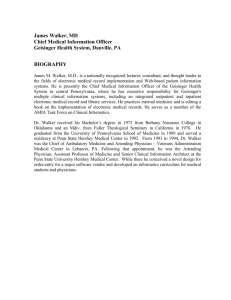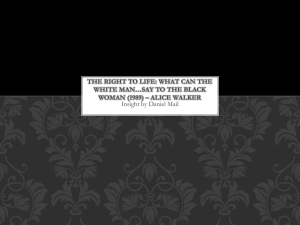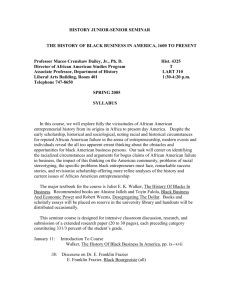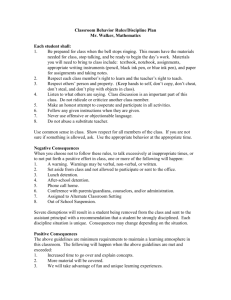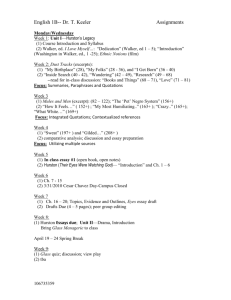Suffering for Racial Justice
advertisement
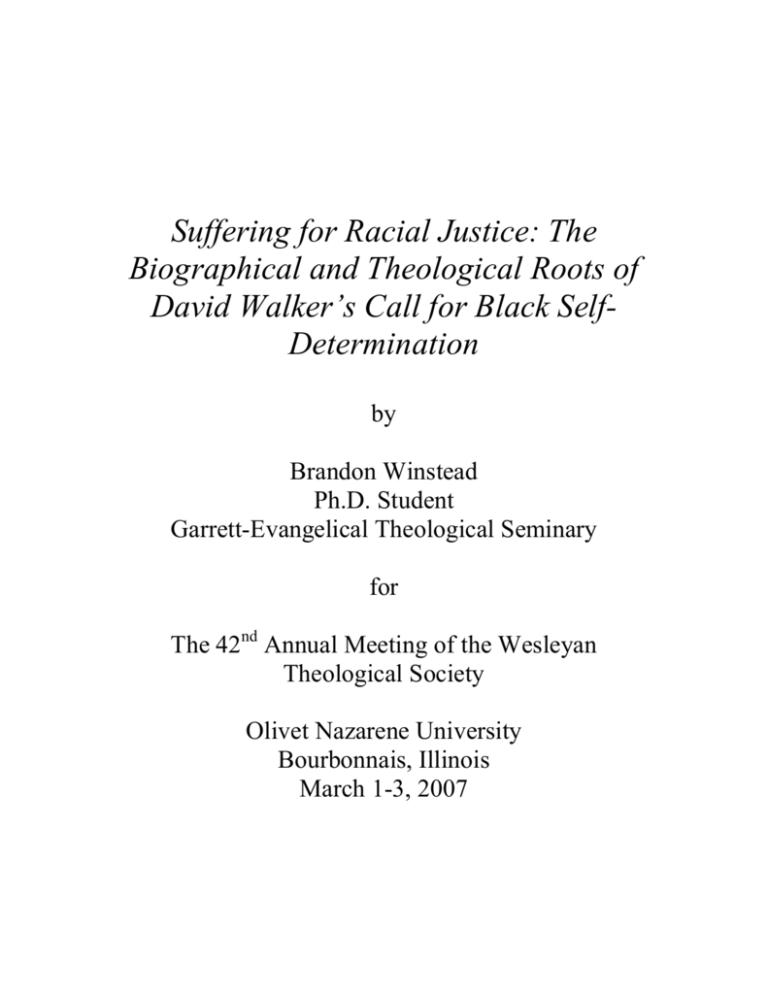
Suffering for Racial Justice: The Biographical and Theological Roots of David Walker’s Call for Black SelfDetermination by Brandon Winstead Ph.D. Student Garrett-Evangelical Theological Seminary for The 42nd Annual Meeting of the Wesleyan Theological Society Olivet Nazarene University Bourbonnais, Illinois March 1-3, 2007 INTRODUCTION In 1829, David Walker, a black Bostonian, used clothing shop owner, and a lifelong Methodist,1 wrote one of America’s most provocative political and theological documents of the 19th century called, Appeal to the Coloured Citizens of the World. Although Walker never received a formal education as a child, by the time he settled in Boston, Massachusetts in 1825, he developed the necessary skills to write his Appeal. In his Appeal, Walker critiqued the corruption of white Christianity and the institution of slavery in four sections, which were entitled, “Our Wretchedness in Consequence of Slavery,” “Our Wretchedness in Consequence of Ignorance,” Our Wretchedness in Consequence of the Preachers of the Religion of Jesus Christ,” and “Our Wretchedness in Consequence of the Colonizing Plan.” In these articles, Walker utilized religious, political, and theological arguments to expose the hypocrisy of white Christianity and American society and to warn them of God’s impending judgment. Most importantly however, Walker wanted free blacks and enslaved African Americans to know that they were loved by God, were created in the divine image of God, and possessed a moral and religious duty to actively engage in the dismantling of slavery and racism. It is the overall purpose of this paper to analyze the biographical and theological roots that influenced the above said relationship and to also show how, in light of his historical and social context; Walker beliefs about black self-determination were 1 Peter Hinks, To Awaken My Afflicted Brethren: David Walker and the Problem of Antebellum Slave Resistance (University Park, PA: The Pennsylvania State University Press, 1997), 66-67. 1 theologically and ethically justified.2 In order to show how this is so, I will first briefly inspect Walker’s biographical background. Then, I will examine how Walker’s relationship with the independent black church, slave theology, and the Black Reform Movement of the 19th century enabled him to argue that African Americans were created in the image of God and possessed a moral obligation to struggle for racial justice. In conclusion, I will summarize the argument presented and assert several closing points regarding Walker’s place in future discussions concerning the struggle for racial justice in the 21st century. BIOGRAPHICAL BACKGROUND For most “free blacks” living in the Antebellum South, life was a daily reminder of the horrors of slavery. Even though some blacks were nominally free, they were constantly reminded of how their brothers and sisters toiled under the hands of slave masters. Like slaves, free blacks were forced to endure the psychological damage that 2 It is important for the reader to remember that David Walker’s Appeal has been widely written about in American history. For example, since the middle of the 20th century, many African-American religious historians have examined the impact that certain black lay and religious leaders, like David Walker, have had on the development of African American nationalism and black theology. Also, in recent years, numerous historical monographs on African American religion have summarized his treatise and briefly analyzed his theology. However, many of these scholars have not analyzed particular theological aspects of Walker’s work in a comprehensive manner. Thus, this paper will attempt to overcome this scholarly neglect and analyze how the theological patterns in slave communities and in independent black churches affected Walker’s theological anthropology and his Christian ethics. For some works that deal with Walker’s contributions to Classical Black Nationalism see Wilson Jeremiah Moses, ed., Classical Black Nationalism: From the American Revolution to Marcus Garvey (New York: New York University Press, 1996); Sterling Stuckey, Slave Culture: Nationalist Theory & the Foundations of Black America (New York: Oxford University Press, 1987); Thabiti Asukile, “The All Embracing Black Nationalist Theories of David Walker’s Appeal,” The Black Scholar 29, no. 4 (1999): 16-24. For some other works that deal with Walker’s overall contribution to African American religious thought and history see Albert J. Raboteau, Canaan Land: A Religious History of African Americans (New York: Oxford University Press, 2001); Gayraud S. Wilmore, Black Religion and Black Radicalism: An Interpretation of the Religious History of Afro-American People, 2nd ed. (Maryknoll, NY: Orbis Books, 1991); Wilson Jeremiah Moses, Black Messiahs and Uncle Toms: Social and Literary Manipulations of a Religious Myth (University Park, PA: The Pennsylvania State University Press, 1992); James Cone, A Black Theology of Liberation, 20th ed. (Maryknoll, NY: Orbis Books, 1986); Rufus Burrow, God and Human Responsibility: David Walker and Ethical Prophecy (Macon, GA: Mercer University Press, 2003). 2 white society perpetuated on those of color throughout the South. In fact, in the coastal regions of North and South Carolina where David Walker spent his early years, “the peculiar institution” connected free blacks and slaves on a daily basis. Sterling Stuckey, in his text Slave Culture: Nationalist Theory and the Foundations of Black America shows how free blacks in the South could not escape the threats of white society upon their freedom. In 1785, the North Carolina government passed legislation making it mandatory that all free blacks wear a badge of cloth on the left shoulder that read “FREE” in capital letters. This law was enacted in order to tighten the constraints on free blacks and mulattoes.3 Nonetheless, the brand “FREE” did not protect blacks from being kidnapped and enslaved, or in many cases re-enslaved. As Stuckey states, It is likely the word FREE on the shoulders of blacks greatly simplified the problem of identification and served as a magnet for kidnappers, since their depredations could hardly hurt those already enslaved. There was, all the while, no lessening of tension, in view of the existence of legislation making it possible for free Negroes who transgressed the laws of North Carolina to be enslaved.4 Walker was born into this social atmosphere around the years of 1796/1797 in Wilmington, North Carolina.5 However, after spending his early years in this environment, most scholars conclude that Walker probably left Wilmington during the 1810’s and traveled southward along the coast to Charleston, South Carolina. Historians are unsure why Walker left, but most concur that it was the abhorrence of slavery and the lack of economic employment that caused Walker to leave New Hanover County. While free blacks in Wilmington lived socially almost solely in the context of slaves, their economic opportunities were also sharply curtailed. Walker probably concluded that the possibilities for him were 3 Sterling Stuckey, Slave Culture: Nationalist Theory and the Foundations of Black America (New York: Oxford University Press, 1987), 98. 4 Ibid., 100. 6 In North Carolina, the children assumed the status of their mother in society and since Walker’s mother was not a slave he assumed her status. For a detailed analysis of Walker’s early life around Wilmington, NC, see Hinks, 1-21 or Brandon Winstead, “Understanding David Walker’s Concept of Justice: An Historical Theological Approach” (Master’s Thesis, Nazarene Theological Seminary), 22-24. 3 so restricted that leaving town would profit him more than remaining. Such a decision would especially have suited a young man of approximately eighteen to twenty years who was intelligent and for the first time seriously assessing his prospects in an exploitative world.6 After leaving Wilmington, Walker traveled throughout different areas of the South and eventually landed in Charleston, South Carolina.7 For a free black living in the antebellum South, Charleston was a place where one could find better prospects of employment and where large numbers of African Americans could organize themselves into mutual assistance associations. Moreover, Charleston had a strong African Methodist Episcopal Church (AMEC) that had established itself among free blacks and slaves by 1817. The prospects of employment, the black autonomy of the AMEC, and the hopes for a better social existence probably were the determining factors that drew the young Walker to the shores of Charleston. However, records show that Charleston could not contain the hopes and aspirations of the young traveler and by 1825, Walker had arrived in Boston, Massachusetts.8 We are not sure why Walker left Charleston, but multiple scholars point out that Walker proceeded north not long after white authorities 6 Hinks, 20. Ibid., 29. In Walker’s Appeal, he makes two references to being in Charleston. On page 12, Walker uses direct quotations found in the Charleston Courier and the City Gazette from the year 1821. The second reference (p. 39) made by Walker of being in Charleston comes via his recollection of a camp meeting he attended around that area. Hinks states revivals were not held in that area until 1816/1817 because steamboats were not employed upon the area’s regional waterways and water transportation would have been the only option for travel to these locations. Furthermore, the author states that this revival was probably held at Goose Creek, which was five miles upstream along the Cooper River. In fact, Hinks believes that Walker attended the camp meeting in 1821 because on April 17 and 21 of the same year, the Charleston City Gazette announced that for the first time steamboats were carrying passengers to two sites that were holding camp meetings quite regularly: Sullivan’s Island and Goose Greek. Goose Greek was probably the place where Walker attended the revival because it would have taken about five hours to reach the site going upstream on a steamboat. This approximation corresponds to Walker’s statement that he traveled five or six hours on water to reach the meeting. Thus, the evidence suggests that Walker was probably in Charleston as late as 1821. 8 Ibid., 64-66. Hinks displays that Walker could not have arrived in Boston no later than 1825 because Boston’s municipal records show that he was listed in the city’s directory in 1825. In those records, only Walker’s shop is on the tax records, which means that he probably lived there for a short while until he found a place of residency. 7 4 shut down the AMEC of Charleston for its alleged involvement in the Vesey plot of 1822.9 With the closing of the Charleston AMEC, Walker likely headed north. He could have traveled west and south before settling in Boston, for he mentions that he journeyed west and witnessed the horrors of slavery.10 Along the way, it is probable that Walker stopped in Baltimore, New York, and Philadelphia because he makes multiple references to knowing the landscape of black existence in those cities.11 Nonetheless, upon arrival in Boston, Walker opened up a used clothing shop on Brattle Street. This road was located in the black section of Boston where African Americans were able to establish independent businesses. However, despite this economic independence among the area’s black population, white legislators attempted to impede the social, economic, and political life of African Americans.12 Aside from overt racial discrimination, Massachusetts, like many other states in the North, enacted legislation that discouraged free blacks from settling in urban areas. In fact, some state 9 When the congregation met its demise in 1822, many of its leaders, including members such as Henry Drayton, Charles Corr, Amos Cuckshanks and Morris Brown left Charleston in haste and eventually settled in Philadelphia, Pennsylvania. Although no historical evidence can substantiate that the AMEC supported the conspiracy, scholars such as Rufus Burrow contend that the Charleston congregation probably supported the plot because many of the parishioners had daily contact with the slave population. According to Burrow, the AMEC of Charleston also probably saw no division between theory and practice. In other words, their biblical faith and theology became the foundation which called them to struggle for liberation by whatever means necessary. Therefore, Burrow concludes that the congregation probably took part in organizing and aiding slave rebellions such as Denmark Vesey’s. For further reference, see Burrow, 26-27. 10 Walker, 76. 11 Ibid., 35. On pages 58 through 67 of his Appeal, Walker displayed vivid knowledge about Philadelphia’s African American community. Although the intricacies of his knowledge about the black community in Philadelphia could have come at a later date, his initial contact could have taken place after he left Charleston and before he settled in Boston. 12 Leonard P. Curry, The Free Black in Urban America, 1800-1850: The Shadow of the Dreams (Chicago: University of Chicago Press, 1981), 260. 5 authorities were successful in deporting blacks from Boston because they were unable to prove their citizenship.13 In spite of these social proscriptions, Walker tarried on with his clothing business and eventually betrothed a woman named Eliza Butler who was a well-established member of a prominent black family. They were married on February 23, 1826 and over the next couple of years, they produced three children.14 Also, around the time he was married, Walker strengthened his connection with Boston’s black community by joining Boston’s African Lodge and the May Street Church, which was an all black Methodist congregation.15 In addition to this, in 1827, Walker became the Boston agent for the country’s first black newspaper, Freedom’s Journal, and even composed several articles for the paper during the same year that he became Boston’s representative.16 However, within three short years and shortly after the third and last edition of the Appeal was published, Walker passed away.17 Many historians claim that his death is shrouded in mystery. There were reports in William Garrison’s abolitionist newspaper The Liberator that some southern bounty hunters were offering $3,000 dollars for the death of Walker. According to those who made this claim, Walker was wanted dead because the Appeal was promoting slave insurrection and civil unrest throughout the South. Various scholars claim that this is a possibility, but there is no historical proof 13 Stuckey, 118; Hinks , 69. 15 This church was led by the Reverend Samuel Snowden, who was an outspoken critique of slavery and racism. Snowden’s powerful personality and antislavery activism probably enticed Walker to become a member of the congregation. 16 Burrow, 20. 17 Herbert Aptheker, “One Continual Cry,” David Walker’s Appeal to the Colored Citizens of the World (1829-1830): Its Setting & Its Meaning (New York: Humanities Press, 1965), 50. 14 6 that foul play transpired. Instead, the probability is that Walker died from a common urban disease of the nineteenth century called consumption.18 THEOLOGICAL AND INTELLECUAL INFLUENCES Since Walker spent a vast amount of time in Wilmington, North Carolina and in Charleston, South Carolina, he saw the impact that slavery had on the psyche of enslaved Africans. According to Sterling Stuckey, Walker probably had exposure to the slave population of Wilmington. Stuckey asserts that despite official policies that banned contact between free and enslaved blacks, social interaction between the two parties did occur. For instance, on Saturdays and Sundays in Wilmington, slaves mingled with whites and free African Americans. The abundance of blacks present at the market was due to the fact that slaves were usually the first to arrive so that they could make purchases for their owners. Stuckey goes on to note that at this public market, conversations could have transpired between free blacks like Walker and the slave population, because the number of slaves present would have made it difficult for whites to overhear all the conversations that occurred.19 Not only would Walker have been privy to the conversations that took place in downtown Wilmington at such an early age, but he probably observed the living conditions of those who toiled on plantation fields. Since they were the poorest segment of the slave population, their abject poverty did not allow them the luxuries that house servants were able to enjoy. Instead, they often lived in huts, which were often visible to the broader public. Thus, as a young child, Walker was probably able to both observe the wretched living conditions as he walked down the roads of Wilmington and also overhear 18 This disease was similar to tuberculosis and would have been prevalent in northern industrial cities like Boston, due to poor sanitation and increased air pollution. See Hinks, 269. 19 Stuckey, 103; 7 slaves describing the horrors of their existence as he mingled with them in Wilmington’s marketplace. In his Appeal, Walker alludes to this probability because he describes in vivid detail the methods that slave holders utilized to dehumanize their chattel. They brand us with hot iron—they cram bolts of fire down our throats—they cut us as they do horses, bulls, or hogs—they crop our ears and sometimes cut off bits of our tongues—they chain and hand-cuff us, and while in that miserable and wretched condition, beat us with cow-hides and clubs—they keep us half naked and starve us sometimes nearly to death under their infernal whips or lashes--…They keep us in the most death-like ignorance by keeping us from all sources of information, and call us, who are free men and next to the Angels of God, their property!!!!!!20 Nonetheless, Walker’s recollection of the daily horrors of slavery and its ability to dehumanize American blacks followed him to Charleston, South Carolina. While Walker was in Charleston, his theological convictions were sharpened by a growing presence of independent black churches and organizations and by the large scores of enslaved blacks that became increasingly concerned about African American freedom.21 For instance, around the time of Gabriel Prosser’s plot in 1802, numerous rebellions had taken place in Virginia and North Carolina. These rebellions were sustained by secret black worship services and by the slaves who drew upon the theological rhetoric of white evangelicalism’s claims of egalitarianism. In fact, according to Hinks, it was this 20 Walker, 68. Hinks, 23-39. In these pages, the writer argues that Walker probably witnessed the substantial migration between 1810 and 1820 that brought 1,800 new free blacks to the Charleston area. This flow of free African Americans increased the population from 1,783 to 3,615 in that ten year period. The majority of those blacks who immigrated were free African Americans who came in hopes to find a better existence. Jobs and employment were more abundant in this area than in other locations of the South and free blacks were able to find employment as artisans and as manual laborers. Aside from labor, mutual assistance among African Americans was strong in Charleston. Benevolent associations were created in the area among free blacks in the early 19th century. However, the greatest institution that brought together African Americans was the AMEC. It was this measure of black autonomy that existed within the Charleston congregation that allowed the church to develop its own system of biblical interpretation that upheld black autonomy, solidarity, and mission. If Hinks assessment is right, then Walker probably spent anywhere from five to ten years in Charleston and was exposed to the social mixture, to the world of slave theology, and to the general mood of social unrest that existed at the local AMEC. For a brief look at the general developments of slave unrest in the South and in areas around Charleston during the 1820’s, see Eugene Genovese, Roll Jordan Roll: The World the Slaves Made (New York: Vintage Books, 1976), 587-598. 21 8 theological and ideological message of egalitarianism that encouraged organized resistance among African American chattel. The potentially subversive message of the revivals’ evangelicalism was equal in significance to the networks they fostered. If not presented with restraint and countering biblical examples, its strong undercurrent of egalitarianism always threatened the existing hierarchies at the same time that it provided rebellious blacks with ideological ammunition…Blacks were the unintended and dangerous beneficiaries of Protestant America’s remarkably successful combination of democratic ideology with evangelicalism’s emphasis on liberty and equality before God.22 In his treatise, The Spirituals and the Blues, James Cone builds on this assertion by showing how slaves and African Americans during this period used biblical narratives to claim that black liberation and salvation was consistent with divine revelation. For instance, Cone maintains that divine liberation of the oppressed from slavery was the central theological concept in 19th century African American spirituals. When enslaved blacks heard the stories of Egyptian bondage, the rescue of Daniel from the Lion’s den, and Christ’s resurrection from the dead in their secret worship meetings and at evangelical revivals, they found a rich narrative that gave them hope. Moreover, when slaves heard the story of how God had delivered the Egyptians from slavery, many trusted that God would also deliver black people from human bondage.23 This trust in God’s salvific activity refracted the faith of the slaves. They sang with assurance the stories of freedom displayed in the biblical narrative: My Lord delivered Daniel, Why can’t he deliver me? When Israel was in Egypt’s land, Let my people go; Oppressed so hard they could not stand, 22 Hinks., 55. James Cone, The Spirituals and the Blues: An Interpretation (Maryknoll, NY: Orbis Books, 1991), 33. Also see Henry H. Mitchell, Black Church: The Long-Hidden Realities of the First Years (Grand Rapids, MI: William B. Eerdmans Publishing Company, 2004), 16-18; Theophus Smith, “Exodus,” in African American Religious Thought: An Anthology, eds., Cornel West and Eddie Glaude, Jr. (Louisville: Westminster John Knox Press, 2003), 314. 23 9 Let my people go; Go down, Moses, way down in Egypt’s land; Tell ole Pharaoh Let my people go.24 Spirituals such as these reveal that discussion about slavery and freedom could not revert to abstraction or metaphor. Within the purview of African thought, there was no division between the sacred and secular. Therefore, African Americans could not accept a religion that negated historical freedom. If they did, they would be pushing against the grain of African culture, values, and religious convictions.25 Moreover, Dwight Hopkins, an eminent black theologian, states that some slaves weaved evangelical faith, African religious values, and the experience of slavery together to nurture a Christian liberation ethos that encouraged resistance against white Christian passivity. Specifically, the author states that slaves thought of Jesus as living during the same period of Moses and the Israelite exodus. Their sense of divine time did not restrict itself to a linear progression of God’s activity, which in turn, would not allow God to intervene in human time. Instead, Jesus (the one who overcame death) was the same figure who led the Israelites out from the bondage of Egypt.26 Hopkins demonstrates how this assertion rested on the slaves’ ability to equate Jesus’ action with the liberation of the oppressed Israelites. Placing Jesus during the time when Moses led the first cross-resurrection journey, the first covenant, prepares the slaves for and confirms the omnipotent, liberating, and irresistible grace of the crossresurrection event, that is, the final covenant. Jesus had a hand in the movement of Israel; when Jesus died, Jesus would never “die no mo” because the cross-resurrection event symbolized the finality of satanic power’ absolute rout…There is no need to fear the earthly white power structure. Since Jesus, 24 Ibid., 41. Ibid., 39; Lawrence W. Levine, Black Culture and Black Consciousness: Afro-American Folk Thought from Slavery to Freedom (New York: Oxford University Press, 1977), 136-137; Stuckey, 103-104; Albert Raboteau, Slave Religion: The “Invisible Institution” in the Antebellum South (New York: Oxford University Press, 1980), 89-92, 275-288; E. Franklin Frazier, The Negro Church in America (New York: Schocken Books, 1964), 23-25. 26 Dwight Hopkins, “Slave Theology” in Cut Loose Your Stammering Tongue: Black Theology in the Slave Narratives, eds. Dwight N. Hopkins and George Cummings (Maryknoll: Orbis Books, 1991), 20. 25 10 through Moses, led the exploited Israelite people to victory and finished off Satan with the Cross and Resurrection, no human advocates for the Devil could defeat Jesus’ just cause of black people’s struggle for liberation.27 In the Appeal, Walker expresses sentiments similar to the claim made by Hopkins. Walker observed that black expressions of Christianity could be a powerful force to bind slaves and free blacks together in their struggle against racial injustice and slavery. For Walker, the true expression of Christianity came through undivided obedience to and worship of Jesus Christ. Walker felt that adherence to Christ provided the courage for blacks to assert their divine right to live in freedom.28 Just as Christ had provided the Moses figure to lead the Israelites out of slavery, God would also deliver a messiah figure for enslaved blacks in order to lead them out of the bonds of the “peculiar institution.” Walker’s trust in the liberating work of Christ was evident when he stated that, Remember, also to lay humble at the feet of our Lord and Master Jesus Christ, with prayers and fastings. Let our enemies go on with their butcheries, and at once fill up their cup. Never make an attempt to gain our freedom or natural right, from under our cruel oppressors and murderers, until you see your way clear—when that hour arrives and you move, be not afraid or dismayed; for be assured that Jesus Christ the King of heaven and of earth who is the God of justice and of armies, will surely go before you.29 For many slaves and for Walker, the very being of Jesus was freedom. Jesus was the representative of the message of liberation both in the present and in the future. Moreover, Cone claims that free and enslaved blacks knew that the Christ of the Bible was the liberator and the deliverer of the weak from the injustice of the strong.30 This ontological claim about Christ and God’s being was often antithetical to the slave master’s insistence that Christian salvation stood on two prongs: individual forgiveness of sin and the promise of eternal life. 27 Ibid., 21. Vincent Harding, “Symptoms of Liberty and Blackhead Signposts,” in Nat Turner: A Slave Rebellion in History and Memory, ed. Kenneth S. Greenberg (New York: Oxford University Press, 2003), 90; Young, 47. 29 Walker, 13-14. 30 Ibid., 38. 28 11 Within a congregation like the Charleston AMEC, slaves and free blacks like Walker knew that this understanding of salvation would not meet their existential needs. Slavery and white passivity contradicted the biblical narrative which testified to the value of all humanity and to God’s mercy towards the oppressed. Thus, any person or group of people who attempted to deny this reality would suffer punishment from the hands of a just God.31 In light of this theological conviction about divine righteousness and retribution, Hopkins states that, Conversely, God punishes the wicked. Understandably, the slaves believed in a theological formula of divine justice and righteousness in which the oppressor reaped the deserved condemnation. Black chattel underwent sadistic and savage treatment at the hands of fiendish white folks…Hence, for the enslaved, the justice and righteousness of God could only bring retribution for tormentors.32 Similarly, Walker claimed that whites should not deny blacks their right to freedom because they were created and made in the image of God’s goodness.33 However, since they refused to repent and work together with blacks in establishing a just society, God would bring destruction upon white America and grant freedom to all African Americans. Every individual may plead innocence, if he pleases, but God will, before long, separate the innocent from the guilty, unless something is speedily done—which I suppose will hardly be, so that their destruction may be sure. Oh American! Let me tell you, in the name of the Lord, it will be good for you, if you listen to the voice of the Holy Ghost, but if you do not, you are ruined!!! Some of you are good men; but the will of my God must be done. Those avaricious and ungodly tyrants among you, I am awfully afraid will drag down the vengeance of God upon you. When God Almighty commences his battle on the continent of America, for the oppression of his people, tyrants will wish they never were born.34 31 Young, 50. Hopkins, 16-17. 33 James H. Evans states that since the dawn of African American religious thought, many black believers have made the theological link between creation and existential freedom. In other words, Evans maintains that ontological declarations about the nature of the divine within African American circles have often been understood in light of God’s historical actions. Thus, when past blacks have declared that they were created in the divine image, then it was logical for them to conclude that God would deliver God’s children from contemporary forms of bondage. See James H. Evans, We Have Been Believers: An African American Systematic Theology (Minneapolis: Fortress Press, 1992), 75. 34 Walker, 49. 32 12 The parallels between Walker’s understanding of a just God and divine retribution are very similar to the undercurrents of 19th century slave theology. Both parties agreed that God would render justice to the oppressed and retribution to the oppressor in order that the created order would reflect God’s plan for creation. Resistance in the name of God was imperative if this order was to be established. According to both Walker and to most slaves that would have gathered together in Charleston, refusal to join God in the struggle against slavery would be a sin against both humanity and God. This theological worldview of free and enslaved blacks and David Walker has been broadly painted because the classes at the Charleston AMEC were led by both free blacks and slaves that embraced this theological paradigm. Within this mixed congregation, themes in slave theology such as existential freedom, God’s justice, and divine retribution against the wicked powers of white Christianity meshed together in an effort to improve the life of African Americans. Both free and enslaved constituents labored together to provide ecclesiastical and theological direction for the black community of Charleston. Their combined efforts reflected a growing autonomous institution that resisted white oppression and injustice in their search for collective racial justice. Their association heightened not only the awareness of many artisanal free blacks regarding the conditions of slaves, but also their commitment to serve them. The building of Charleston’s African church evinced their commitment. A glaring symbol of black resistance to white hegemony, the church also stood as a constant reminder to all blacks of how they might seek out freedom together.35 Nevertheless, although Walker was a Methodist, most white evangelicals would have condemned his assertion that armed resistance was a testimony of Christian faith.36 35 Hinks, 28. In his monograph, Cosmos Crumbling: American Reform and the Religious Imagination, Robert H. Abzug states that even radical evangelical abolitionists such as William Lloyd Garrison could not come to terms with Walker’s ethical conclusions that African Americans were justified in taking up arms to 36 13 For Walker and for many other blacks, resistance to evil rested on the conviction that God loved black humanity and desired that they live in a just society. This type of theological thought was forged and cultivated among both free and enslaved black Methodists in Charleston. Walker’s own theological claim that God was just and that salvation was not merely an otherworldly affair was inherited from Charleston’s AMEC. This theological tradition gave Walker courage to struggle against the institution of slavery as he traveled and settled in the city of Boston, Massachusetts. While in Boston, David Walker became increasingly affiliated with the Black Reform Movement that was prominent among numerous black communities in the North. By the mid 1810’s, black churches in northern urban areas were forming as separate entities without the aid of white Christians. In cities such as Philadelphia, New York, Wilmington, and Boston, black congregations separated themselves from the mainline denominations. In addition, benevolent associations in the North increased in number and size. The combination of growth in black churches and benevolent societies led to an increase in black activity in the North. Resting on a settled infrastructure of numerous benevolent organizations, black churches, residential proximity, and a deep-seated ethos of mutual assistance, black communities, especially in such major centers as Boston, New York City, and Philadelphia, had not only become fully aware of themselves as distinctive entities with their own specific needs, but were much more assertive in pronouncing that difference publicly and pursuing their own ends.37 Also, by the mid 1820’s there was an increased desire among some black Bostonians to achieve African American political ends through the printed word. For abolish slavery. Instead of appealing to armed conflict, Garrison hoped that moral persuasion would cause whites to abolish slavery before God’s judgment would destroy the nation. For further discussion, see Robert H. Abzug, Cosmos Crumbling: American Reform and the Religious Imagination (New York: Oxford University Press, 1994), 147-148. See also Donald M. Jacobs, “David Walker and William Lloyd Garrison: /Racial Cooperation and the Shaping of Boston Abolition,” in Donald M. Jacobs, ed., Courage and Conscience: Black and White Abolitionists in Boston (Bloomington: Indiana University Press, 1993, 917. 37 Hinks., 91. 14 instance, the first black newspaper, Freedom’s Journal, began to advocate for racial solidarity and moral uplift. This paper’s editors were Reverend Samuel Cornish, a Presbyterian minister in New York City, and John Russworm.38 In Freedom’s Journal, there were numerous exhortations to establish associated leagues of uplift throughout black society.39 Even though this paper advocated racial solidarity, moral uplift, and social justice for African Americans, it did not argue that national racial union was necessary to lift blacks out of their oppression. However, Walker attempted, through his work in the Massachusetts General Colored Association (MGCA), which was formed in 1828, to provide racial solidarity on a national scale. In 1828, Walker delivered a speech to the MGCA, in which he called for the unity of blacks on a national level. The primary object of this institution, is, to unite the colored population, so far, through the United States of America, as may be practicable and expedient; forming societies, opening, extending, and keeping up correspondence, and not withholding anything which may have the least tendency to meliorate our miserable condition.40 Moreover, Walker perceived that the connective tissue that would bind a national black organization was the Christian faith. According to Walker, if blacks would pursue the Christian faith then their oppression would be alleviated. That the major part of us are ignorant and poor, I am at this time unprepared to deny.—But shall this deter us from all lawful attempts to bring about the desired object? Nay, sir, it should rouse us to greater exertions; there ought to be a spirit of emulation and inquiry among us, a hungering and thirsting after religion; these are requisitions, which, if we ever be so happy as to acquire, will fit us for all the departments of life; and, in my humble opinion, ultimately result in rescuing us from an oppression, unparalleled, I had almost said, in the annals of the world.41 38 Wilmore, Black Religion and Black Radicalism, 92-93. Hinks, 93. In addition to themes of racial uplift, Eddie Glaude, Jr. states that through the Freedom’s Journal, Samuel Cornish and John Russworm helped to broadly diffuse the symbology of Exodus among African Americans, which, in turn, nurtured discussions about freedom and the eventual destruction of slavery. For further reference see Eddie Glaude, Jr., Exodus!: Religion, Race, and Nation in Early Nineteenth-Century Black America (Chicago: The University of Chicago Press, 2000), 59-61. 40 Walker, 85-86. 41 Ibid., 87. 39 15 Walker perceived that moral uplift and racial solidarity were not antithetical to African American Christianity and his assertions were expressed by previous northern black clergy and lay leaders. For example, William Hamilton, the president and cofounder of the New York Society for Mutual Relief (NYSMF) delivered a speech to an assembly at the New York City Universalist Church on January 2, 1809. This speech was delivered in order to explain the aims of the NYSMF to those in attendance. In his oration, Hamilton made clear that African Americans had a duty to uplift the social conditions of the widows, orphans, and the poor and establish racial justice in black communities throughout the North. According to Hamilton, blacks who joined the society had to display moral propriety in their daily lives and especially at all NYSMF meetings. With regard to the connection between moral propriety and social uplift, Hamilton stated that NYSMF members should, Guard against the enemy, for enemies we have that would make merry at our overthrow; but above all things let our meetings be conducted with order and propriety, let order be our guide and peace our way make; let friendship and good will be our atmosphere, be attentive to the sick members, never let it justly be said that we assumed the name of Mutual Relief for naught.42 Moreover, as early as 1797, black leaders such as Prince Hall stressed that African American masons who worked to solidify black unity, to abolish racial oppression, and to eradicate slavery should always remain faithful to the Christian God through the practice of worship. Hall claimed that Christian worship was imperative because it was God who gave strength to his children so that they may not succumb to the threats of white society. Let us then love and adore him as the God who defends us and supports us and will support us under our pressures, let them be ever so heavy and pressing. Let us by the blessing of God, in whatsoever state we are, or may be in, to be content; for clouds and darkness are about him; but justice and truth is his 42 William Hamilton, “Mutual Interest, Mutual Benefit, and Mutual Relief” in Lift Every Voice: African American Oratory, 1787-1900, eds. Philip S. Foner and Robert James Branham (Tuscaloosa: The University of Alabama Press, 1998), 85. 16 habitation; who had said, Vengeance is mine and I will repay it, therefore let us kiss the rod and be still and see the work of the Lord.43 In similar fashion, Walker knew that the very being of God was just and that all African Americans should reflect upon God’s nature in their quest for racial justice.44 According to Walker, Christian worship would reveal to blacks that God created them in the likeness of the divine image. If God created blacks in the image of God, then they were a part of the human family and were required to obey their heavenly master, instead of their earthly one. Are we Men!!—I ask you, O my brethren! are we MEN? Did our Creator make us to be slaves to dust and ashes like ourselves? Are they not dying worms as well as we? Have they not to make their appearance before the tribunal of Heaven, to answer for the deeds done in the body, as well as we? Have we any other Master but Jesus Christ alone? Is he not their Master as well as ours?—What right then, have we to obey and call any other Master, but Himself? How could we be so submissive to a gang of men…45 Consequently, it was through worship that blacks would realize that they had a right to assert their humanity on a national scale. If any group of the human family (including whites) attempted to deny this right of Christian obedience, then African Americans had a right to oppose those who stood in their way. Furthermore, the Appeal’s assertion that all blacks should obey a just God rested on a theological and biblical tradition articulated by other African Americans who were members in organizations such as the African Society (AS), which was located in Boston, Massachusetts as well. The leaders of this association asserted that a just God would not tolerate competition from any earthly masters who would continue to hold his people in 43 Prince Hall, “A Charge, Delivered to the African Lodge, June 24, 1797, at Menotomy” in Early Negro Writing: 1760-1837, selected and introduced by Dorothy Porter (Baltimore: Black Classic Press, 1995), 75. 44 John C. Diamond, “David Walker’s “Appeal”: A theological Interpretation,” The Journal of the Interdenominational Theological Center 3, no. 1 (Fall 1975): 34-35; Burrow, 149-150; Young, 49. 45 Walker, 18. 17 slavery. In 1808, the AS published an essay that reflected this vein of thought. The members stated that, To know that the lord reigneth, ought and will afford the slave the greatest consolation of anything in this world, if his heart is right with God. Yea, he need not be discouraged, knowing that all his oppressors shall suppose it is displeasing to him; so, therefore, the oppressors shall not be unpunished.46 Walker in his Appeal used theological pronouncements such as this. In the fourth article of his Appeal, Walker fumed, Will not the Lord yet humble them? Or will not these very coloured people whom they now treat worse than brutes, yet under God, humble them low down enough?...The Americans may be as vigilant as they please, but they cannot be vigilant enough for the Lord, neither can they hide themselves, where he will not find and bring them out.47 Walker and his predecessors knew that God had created blacks in the image of God and that the Creator’s justice would be rendered on any population that attempted to destroy the humanity of others. Therefore, it was a black Christian anthropology that African Americans in the early 19th century utilized to express why God desired to end their oppression. If blacks and slaves were not created and loved by God, then whites could justify God’s indifference to slavery. However, if certain black organizations could unite all African Americans on a national level utilizing this theological paradigm, then they could justify armed resistance. Thus, the right to oppose (even if it required armed resistance) was an inherited belief that Walker heightened in his Appeal. The call for national unity was imperative if blacks were going to assert their humanity against white oppression. For Walker, the success of the Black Reform Movement depended upon persons like him to communicate to all African Americans (both free and enslaved) the message that blacks, both free and enslaved, had to obey the divine mandates of a just God and end the system of white 46 “The Sons of Africans: An Essay on Freedom with Observations on the Origin of Slavery” in Early Negro Writing: 1760-1837, selected and introduced by Dorothy Potter (Baltimore: Black Classic Press, 1995), 27. 47 Walker, 79-80. 18 domination. Knowledge of this truth entailed awful responsibilities and according to Walker, the Christian scriptures made clear that one of those responsibilities might be to resist the enemies of God. In all, Walker stated that black self-determination and racial justice were only possible if African Americans were informed about their humanity and the right to rebel against oppression. Walker held that blacks were human beings by definition and therefore his people had the capacity for thought, self-love, self-conscious awareness, and self-determination.48 If slavery denied African Americans the opportunity to develop these capacities, then Walker contended that every black person should be taught that God justified them in asserting their human rights, even if it could only be acquired through armed resistance.49 CONCLUSION Throughout this paper, the reader has been exposed to some of the various social, historical, and theological movements that impacted Walker’s theological anthropology and his call for African American self-determination. When interpreting and assessing his thought, it is important to remember that Walker’s theology emerged out of his concrete experiences with those who suffered under the yoke of slavery and the bondage of national racism. Thus, his conceptions about self-determination and black Christian protest against racial injustice were rooted in the theological and historical traditions that were available to him via the autonomous black church and the northern Black Reform Movement. 48 49 Burrow., 138. Ibid., 139. 19 In light of this, I would assert that Walker’s conceptions surrounding racial justice were theologically and ethically justified and were a faithful representation of black Christian protest, especially in light of the horrors of antebellum slavery and 19th century racism. When looked at theologically, his faithful call for self-determination became an issue of survival. The institutions of slavery and white racism were so severe and rigid that it gave Walker no other alternative than to contend that a God of love and justice would empower blacks to end racial oppression, even if it required taking up arms. Furthermore, although Walker beckoned white America to repent of its sins so that God would not enact judgment and bring destruction upon America,50 he doubted that national repentance would take place. Therefore, he realized that if blacks were going to survive and eventually thrive as a part of God’s beloved creation, then they had to bring down the very forces that dehumanized and oppressed them. Nonetheless, whether or not one agrees with the theological conclusions and ethical mandates that Walker asserted, I believe that it is imperative for Christian scholars in the 21st century to not only explore his biographical and intellectual roots, but also engage some of his specific theological premises that impacted his thoughts on racial justice and black self-determination. We continue to live in a world that is plagued by racial oppression and where religious communities of color are seemingly justified in using violence to end their oppression. And, when armed resistance is used or discussed as a viable option, many privileged Christians denounce those measures as non-Christian, without taking into account the very systems that give rise to these sentiments. If American Christians in general and Wesleyans in particulars are going to struggle for racial justice in the 21st century, then we must become sensitive to oppressive 50 Walker, 45 20 social conditions in America and abroad and begin to analyze and engage the historical and contemporary forces that create new systems of racial oppression. If we do not, then, as Walker revealed so many years ago, calls of Christian obedience to a holy God will be empty and hollow. Finally, by looking at Walker’s theological roots, his theological anthropology, and his call for African American self-assertion, we see a clear and concise statement about God’s love for oppressed human beings and the responsibility of the exploited to respond to that love in history. Thus, it is safe to say that to disregard Walker is to ignore a voice that beckoned past and current Christians to understand the depth and breadth of God’s love for all humanity and a voice that summons all Christians to realize that the struggle for racial justice is a concrete and faithful expression of Christian love and obedience. 21



